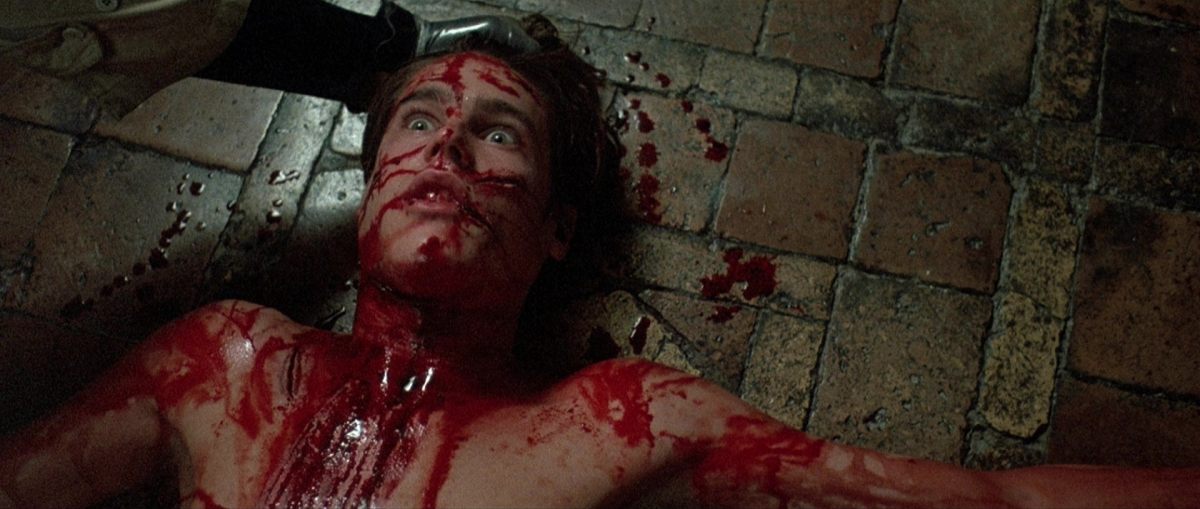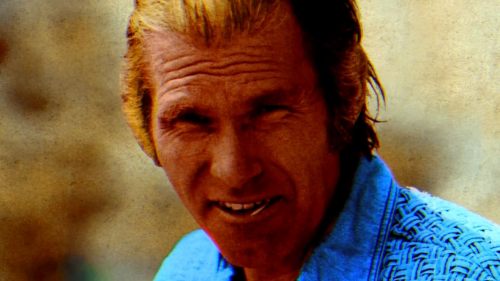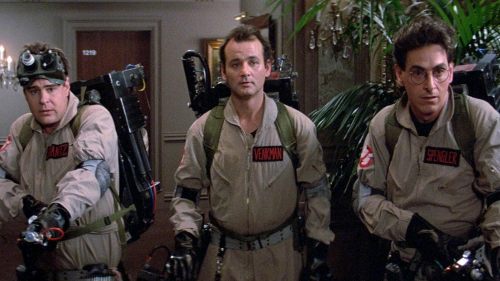Collins’ Crypt: Movies I Love - OPERA
One of the reasons I began Horror Movie A Day was to "force" myself into catching up on foreign horror films, particularly the Italian ones. At that point (early 2007) I had only seen a handful of titles, and while I was at least choosing well (Demons, Suspiria, and Dellamorte Dellamore (a.k.a. Cemetery Man) were among those few), I felt a bit ashamed that I had seen more of Charles Band's filmography than Mario Bava's. So when I started the site and began loading my Netflix queue (that would be the DVD version) with horror titles, I was sure to stock up with all the titles I could find from Bava (and his son, Lamberto), Michele Soavi, and of course Dario Argento, whose work I was the most familiar with thanks to Suspiria and Phenomena (plus Demons, which he wrote and produced). And the first one I got was Opera - in fact it was the very first Italian film I reviewed for the site.
So perhaps that accounts for some of my love for the film, which remains in my five favorite of his films and likely won't ever leave as it seems his best days are behind him. I don't hate his newer films as much as some of my peers, but while I enjoy the likes of Mother of Tears and even Dracula 3D to a degree, I would be the first to admit they're miles away from his best work. But I put Opera up there with Deep Red, Suspiria, Tenebrae, and Phenomena as my favorites of his films (I haven't "forgotten" Inferno; I just don't connect with it all that much and find myself only enjoying certain scenes rather than the film as a whole), though the actual placement varies quite often. But I know this for sure: it was the last of his films I loved - I've enjoyed most of the ones that followed, but wouldn't feel the need to defend them or anything like that - they're all just varying degrees of "OK".
Oddly enough, the only one I flat out dislike is 1998's Phantom of the Opera, which is a direct (if not 100% faithful) version of Leroux's novel, as opposed to this more "inspired by" deal. The plot setup is the same here as in countless "straight" adaptations of Phantom: after the lead actress for a stage production is taken out of commission, her understudy takes over the role and catches the attention of a mysterious man who hangs out in the theater - the man who may be responsible for a series of accidents and deaths that occur there. But this is a giallo from Dario Argento, and there's a distinct lack of romance, so as you can imagine the ties to the original story are hard to find once the basic plot is established. The "Raoul" equivalent, for example, is her friend Stefano (William McNamara), who is killed off at the half hour mark instead of playing hero.

After Phenomena dabbled in adding supernatural elements to a giallo plot, this one is back to reality - or, at least, what passes for reality in a Dario Argento movie. I am not sure if using ravens to identify murder suspects is a legit police tactic, as is the case here, but it's not overtly out of the realm of possibility like Jennifer Connelly summoning swarms of insects in the other film. Speaking of the raven scene, it's one of the film's major highlights from a technical standpoint, employing a crazy camera setup (installed over the base of a chandelier, offering the film a subconscious tribute to Phantom's most famous sequence) that swoops and swirls over the audience. It's simulating the raven's POV as he locates the murderer (the raven witnessed him kill someone, plus a few of his fellow birds), a plan set in motion by the opera's director Marco (Ian Charleson), and bless his imagination, it actually works! The damn birds do a better job at sussing out the killer than any of the human characters - and gouge out his eye for good measure.
Unfortunately Marco didn't think to tell any police or even an usher about it, so instead of being apprehended after identification, the now half-blind killer just starts shooting at the actors, nearly doubling his body count in the process. These kills (not even confirmed, actually) are kind of quick and random, but fear not - the film offers three of Argento's most memorable kill scenes ever. Two of them involve one of the film's most iconic images: the shot of heroine Betty (Cristina Marsillach) with her eyes taped open with a set of pins, an idea that sprung from the filmmaker's wish to tape open the eyes of viewers who would look away from his gore scenes. Unlike an eye speculum, this "device" doesn't exactly force your eyes to remain open - you'll just poke holes in your eyelid if you try. Betty's panicked half-blinks cause a few injuries, and I'm not joking when I say that this is harder for me to watch than any traditional kill scene that Argento had orchestrated up until that point (the inciting incident in Trauma might replace it; despite how ludicrous it was it really bothered me). And in the second of these, the victim uses one of their last living moments to swallow a necklace that the killer was trying to obtain, resulting in him sawing her neck apart to fish it out - the sort of gruesome but morbidly amusing touch that you simply don't get in your average slasher film.
The other kill is one for the ages, occurring in the middle of the film's most suspenseful setpiece, and involves Betty and her agent (Daria Nicolodi) trying to figure out which of the two men claiming to be "Inspector Soavi" is the real deal and which one is actually the killer. We find out for sure when the killer fires a gun through the peephole, which hits Nicolodi right in the eye, the bullet then exiting her head and taking out a telephone as a bonus. Amusing trivia aside (Nicolodi and Argento had broken up two years before, and the effect required her to put a squib on her head, which is an amazing amount of trust to bestow on an ex-lover), it's a great shock moment and a fine way to off a would-be red herring, with the added attraction of the cat and mouse stuff that follows. It also redeems our heroine; earlier in the film, Betty reacts to her boyfriend's death by casually walking over his corpse and going outside, where she seems more concerned with her wet hair and acts like she just had a fight with the guy as opposed to bearing witness to his brutal murder, which makes her kind of an asshole in my eyes. If she similarly blew off her agent's death, it'd be easy to stop caring about the proceedings, so this got her back in my good graces.
As for the plot itself, it's the usual giallo silliness involving fragmented memories and a killer who hates women (the reasons vary, at least, but that's almost always the gist of it, even when the killer is a woman herself), but I must admit that I did not peg the murderer on my first viewing. I was eyeballing another character, and on subsequent viewings I kind of feel dumb about it but that's fine - I'd always rather be surprised than know who it is all along (one of my few issues with the recent Happy Death Day is that I figured it out on the second scene with the character), even if I have to question my film-watching abilities on a second view. Luckily the opera element isn't really part of it, which lets the film diverge more from the Phantom story (which I don't particularly like, if you recall) than it might seem at first. The aforementioned Soavi made his own theater-set giallo/slasher that year with Stage Fright, and the plot of their play is an important element in the plot of the film, tying the two together in a way that is largely absent here, thankfully. We see very little of their Macbeth production, and we spend little time with other people directly involved with the play besides Betty and Marco - it's part of the film's flavor, not its entire focus.

And that brings me to one of the other things I love about the movie. One thing about theater vs films is that the viewer only gets one angle on the proceedings, so it's kind of ironic that Opera employs some of Argento's most elaborate camerawork, on his first feature collaboration with cinematographer Ronnie Taylor (whom he first worked with on a commercial the year before). In addition to the aforementioned raven sequence, there's the De-Palma esque opening tracking shot, simulating the diva's POV as she gets frustrated with the production, walks out and promptly gets hit by a car (the diva was set to be played by Vanessa Redgrave, but when they lost her participation due to shooting delays, the character became largely unseen). Argento's interview on this new disc is interspersed with some behind the scenes footage showing how these and other shots were pulled off; it's not as colorful or production design-heavy as Suspiria, but thanks to the near constant motion (and bigger than usual cast) it's one of Argento's "busiest" films, firmly setting it apart from his other gialli even though most of the actual plot is a retread. The soundtrack also helps set it apart a bit; Claudio Simonetti contributed some tracks (including the terrific title theme) but it's also got selections from Brian Eno, Bill Wyman, a few hard rock songs (not as many as in Phenomena, I should note), and a handful of compositions from earlier operas, including Verdi's Macbeth and Puccini's Madama Butterfly. While no one would have minded if Simonetti was the sole composer, it's one of the least repetitive soundtracks to listen to on its own, and again, really helps distinguish the film that might have otherwise come off as Argento copying himself.
If there's one thing about Opera I don't like, it's that it doesn't give enough screentime to Marco/Charleson. An acclaimed actor from film (he co-starred in two Best Pictures in a row, Chariots of Fire and Gandhi) and stage, he's certainly the best actor in the film by a mile*, and his character is the rarest of things: a fairly decent man in an Argento movie! The further away you get from these films (and thus the more attitudes change) the harder it is to sympathize with most of the males in these movies, who are either villains, misogynists, or sex-crazed (or all three), but while Marco is said to have an eye on Betty, he doesn't act on it and thinks nothing of ruining his own production by coming up with the plan to set the ravens free during it. Possibly to keep him as a suspect for the killer, he disappears for large stretches, and every time I watch the film I keep wanting to see more of him. His role, as a horror director who is trying his hand at a stage production so people will take him seriously, is a bit autobiographical of course, but it never feels self-indulgent - it just comes off like an interesting character who could have used more screentime.
Doppelgänger and Scorpion Releasing's disc looks terrific, and has a few bonus features to sweeten the deal (including a pretty good new interview with Argento), though I was a bit miffed to see that it lacked a subtitle track. It's the film's debut on Blu-ray here in the US after a few overseas releases, inching us closer to getting the maestro's complete filmography on high-def without having to settle for expensive import discs. It's been a great couple of years for Argento fans who still swear by physical media, with Synapse doing phenomenal releases for the likes of Suspiria and Tenebrae and Arrow giving you exhaustive sets for Deep Red and The Bird With The Crystal Plumage that are worth every penny you'll have to fork over. It's clear that the companies want to do right by these films, and I'm glad Opera is joining the pack after years of being kind of forgotten about (some of those titles have been released three times on Blu in the US; again, this is Opera's first appearance here) for whatever reason (presumably rights issues). If you've never seen it, there's no better time to get on board.
*To be fair, the dubbing hurts some performances, particularly McNamara's.



